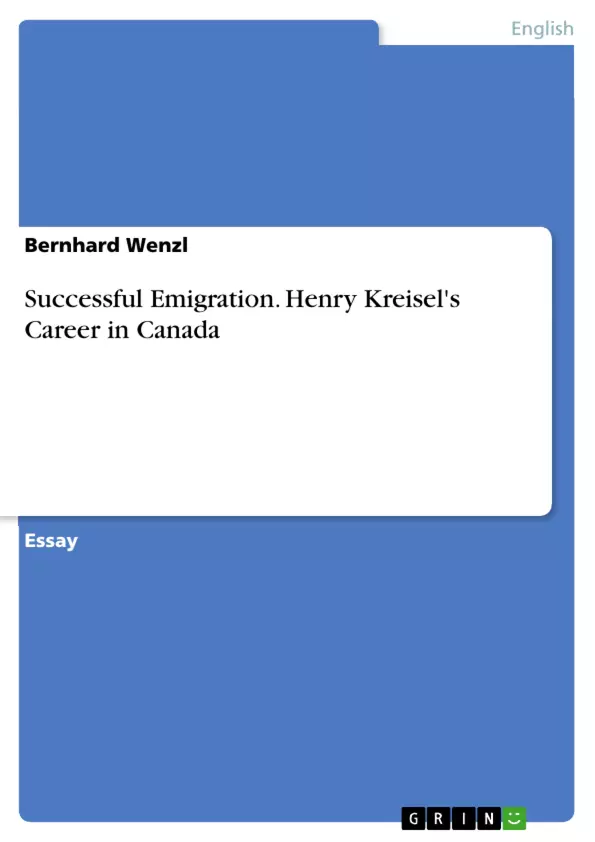Henry Kreisel had an eventful life. A native of Vienna, he left Austria in 1938 and was soon imprisoned as an enemy alien in England and taken to an internment camp in Canada. With his later career as a professor and author, he achieved something that many Jewish refugees were denied: a successful emigration. This paper talks about his life, influence and the works he published.
Henry Kreisel is born in Vienna on June 5, 1922, to a middle-class Jewish family. He lives a sheltered childhood and youth in the Leopoldstadt, the second Vienna district. With his parents and his brother, who is two years younger, he enjoys trips to the Danube and the Prater. He becomes interested in literature at an early age and starts writing poems and stories. As a high school student, he regularly attends the Burgtheater and the State Opera House with a friend. But in May 1938, an anti-Semitic incident at school leads him to stay away from classes for fear of increasing discrimination. With the support of a relative, he is able to emigrate to England as early as July 1938; his brother follows in January 1939, and his parents join him in August 1939 after their release from the Dachau and Ravensbrück concentration camps.
Inhaltsverzeichnis (Table of Contents)
- A Successful Emigration
- Diary of an Internment
- Vienna Remembered
- The Torch of Hate
- The Rich Man
- Problems of Writing in Canada
- The Prairie: A State of Mind
- The Almost Meeting and Other Stories
- The Betrayal
Zielsetzung und Themenschwerpunkte (Objectives and Key Themes)
The text chronicles the life of Henry Kreisel, a Jewish emigrant from Vienna, Austria, who found success as a professor and author in Canada. It details his experiences during World War II, including his internment in England and Canada, as well as his later academic and literary career. The text explores themes of emigration, identity, and the impact of historical events on individuals and society.
- The challenges and triumphs of emigration
- The experience of internment and its lasting effects
- The cultural and social landscape of Vienna and Canada
- The role of literature and art in navigating personal and societal challenges
- The impact of the Holocaust and its legacy
Zusammenfassung der Kapitel (Chapter Summaries)
- The text begins with an excerpt from Kreisel's "Diary of an Internment," which details his initial imprisonment in England and subsequent internment in Canada. This section sets the stage for his journey and the challenges he faces as a young Jewish refugee.
- The text then explores Kreisel's early life in Vienna, his family, and his burgeoning interest in literature. The description of his experiences during the rise of Nazi Germany highlights the escalating discrimination and the difficult decision to emigrate.
- The text delves into Kreisel's experiences as an internee in Canada. It discusses his pursuit of education, his literary aspirations, and his eventual decision to make Canada his home. It also touches upon the complexities of his relationship with his former homeland, Vienna.
- The text examines Kreisel's successful academic career, including his achievements at the University of Alberta, his contributions to Canadian studies, and his numerous awards and honors. This section underscores his dedication to education and his lasting legacy.
- The text highlights Kreisel's prolific writing career. It discusses his first novel, "The Rich Man," which explores themes of Jewish culture, immigration, and the contrasting realities of life in Vienna and Canada. The text also briefly mentions his second novel, "The Betrayal," which deals with the complexities of complicity and responsibility during the Holocaust.
Schlüsselwörter (Keywords)
Key themes and concepts explored in the text include Jewish emigration, internment, cultural identity, Canadian literature, Holocaust, refugee experiences, academic achievements, and the impact of historical events on individual lives.
Frequently Asked Questions
Who was Henry Kreisel?
Henry Kreisel (1922–1991) was a Jewish-Canadian author and professor who emigrated from Vienna to escape Nazi persecution. He became a prominent figure in Canadian literature and academia.
What was Kreisel's experience during World War II?
After fleeing Vienna for England, he was classified as an "enemy alien" and interned in camps in England and later Canada. He documented these experiences in his "Diary of an Internment."
What are the main themes of his novel "The Rich Man"?
The novel explores the immigrant experience, the contrast between the reality of life in Canada and the idealized image held by relatives in Vienna, and the complexities of Jewish identity.
How did Kreisel contribute to Canadian academia?
He had a distinguished career at the University of Alberta, where he served as a professor and administrator, significantly contributing to the development of Canadian and comparative literature studies.
What is "The Prairie: A State of Mind"?
It is one of Kreisel's influential essays where he discusses the impact of the Canadian landscape on the human psyche and its representation in literature.
Why is his emigration described as "successful"?
Unlike many Jewish refugees who faced lifelong hardship, Kreisel managed to build a prestigious career, gain widespread literary recognition, and fully integrate into Canadian society while honoring his roots.
- Quote paper
- Bernhard Wenzl (Author), 2022, Successful Emigration. Henry Kreisel's Career in Canada, Munich, GRIN Verlag, https://www.hausarbeiten.de/document/1281109


